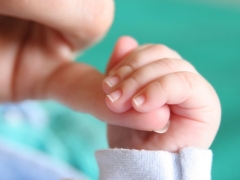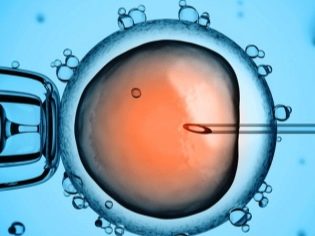What IVF is considered successful? Feelings at the come pregnancy
In vitro fertilization, even conducted in a good clinic by doctors with extensive experience in working with reproductive technologies, cannot guarantee the onset of pregnancy. The procedure is complicated, long, expensive and, alas, not always successful. But all couples who go to IVF are striving for success, because for the sake of it all is being started. In this article we will tell you what IVF is considered successful, whether it is possible to get pregnant the first time, as well as what are the symptoms and sensations, if pregnancy after embryo transfer has nevertheless occurred.
What does the outcome depend on?
Successful IVF is an in vitro fertilization protocol that ends with the onset of pregnancy. Successful protocols from the first attempt - the dream of any couple who decided to resort to solving the problem of infertility through assisted reproductive technologies. However, in practice, things are not so bright.
The success of the protocol depends on the quantity and quality of the eggs produced. If ovarian stimulation was carried out, all dosages and preparations were selected correctly, the ovaries responded adequately to the stimulation, there is a high probability of getting more eggs. In order to increase the chances of success, fertility specialists must receive at least 3 eggs.
The quality of male sperm, which is fertilized in laboratory incubator conditions, can also affect success. If there is a sufficient number of live and motile sperm, then the chances of fertilization of oocytes grow. If the man does not have morphological changes in the spermogram, there are chances to get stronger and more viable embryos.
Important and tactics of embryo transfer. Too fast transfer reduces chances of implantation. If 5-days old embryos are placed on a woman, the chances of their successful implantation in the endometrium of the uterus are increased compared to 2-day embryos. Compliance with all recommendations of the doctor after replanting increases the likelihood of success. Violation of recommendations, on the contrary, increases the risks of the “spanning” protocol. It is important for a woman to lead a quiet life, not to lift weights, not to go to the bathhouse and not to take hot baths, not to be nervous and keep calm. If hormonal support drugs are prescribed, they should be taken in strict compliance with the recommended regimen, dosage and frequency.
One of the most important factors of influence is considered the age of the patient. The younger the woman at the time of entry into the IVF protocol, the higher the chances that the protocol will be happy. After 35 years, the success rate is significantly reduced. The age of a man is important only in terms of the quality of his sperm and its DNA set. The older the man, the higher the likelihood of impaired sperm morphology, their mobility.
To increase the chances of pregnancy, 2-3 embryos are tried to be inserted into the uterus. If such a quantity could not be obtained initially, or problems arose at the fertilization stage (it did not happen), the protocol can be completed ahead of time, an attempt will have to be started over again in a few months.
The probability of successful implantation is reduced if a woman has diseases of the uterus and its appendages, endometrial heterogeneity, postoperative uterine scars, fluid accumulation in the fallopian tubes.With ovarian depletion, the ability to get the right number of eggs is much lower.
Chance of luck
This question interests all those planning pregnancy through in-vitro fertilization, regardless of what kind of attempt the couple has to make. The probability of conceiving a child from the first attempt in women under 35 years old without concomitant serious diseases of the reproductive organs is on average 35-45%. For women over 45, this probability is no more than 8-10%.
The second and third attempts are usually much more successful - the chances are increased by 5-10%. On the fourth attempt, the odds begin to decline again. The second IVF after a successful first one can not guarantee. If the first procedure was successful and a healthy baby was born, then during the protocol of the second pregnancy there may be various obstacles that may prevent the same, as for the first time, easy pregnancy.
To the question of which protocol is most likely to get pregnant, there is no definite answer. For many, after the first failure, the second or third protocol is completed successfully, some have to make 8-9 attempts.
It should be noted that any protocol in which the pregnancy occurred is considered successful, and it does not matter how it ended. The fact of pregnancy is regarded by doctors as a positive protocol. In 15% of cases, pregnancy, which was made possible by IVF, is interrupted in the early stages. Miscarriage or missed abortion can occur for a wide range of reasons. Premature delivery occurs in 10% of cases. In 1-2% of cases after embryo grafting, an ectopic pregnancy develops. Pregnancy after IVF is completed in the birth of a live child in 80-85% of cases.
When entering into an in vitro fertilization protocol, a woman and her partner should be well aware that payment for clinic services under a health care agreement is not a guarantee of success. In case of an unsuccessful attempt, the money is not returned to the patient. Do not put too high hopes on pregnancy, because in more than half of the cases after the first attempt, the woman’s next term begins on time, and it can be quite difficult to get rid of frustration and depression.
The right attitude with an understanding of all statistical probabilities will help to respond more adequately and increase the chances of pregnancy, since stress hormones only reduce the likelihood of successful implantation of the ovum.
Signs and symptoms of pregnancy to delay
After embryo transfer to the uterus, a woman begins to more closely “listen” to her feelings and changes in the body, hoping to notice as soon as possible that the protocol was a success. The first changes in habitual sensations can be seen only after the embryo is able to penetrate the endometrium of the uterus and begins to develop. Chorionic villi from the first day after implantation will begin to produce a special substance - the chorionic gonadotropic hormone, which is the basis of early pregnancy diagnosis.
The concentration of the hormone will increase in stages, doubling approximately twice every two days. Implantation most often occurs at 3-6 dpp (day after transfer). In this way, in the blood of a woman it will be possible to record the growth of the hormone from 10-12 days after replanting.
But with IVF, the time of implantation is quite difficult to determine, and therefore it is recommended to donate blood for hCG no earlier than 14 days after embryo transfer.
During these two weeks, you should not constantly look for symptoms and signs of pregnancy, so that you do not experience bitter disappointment. It is best to do interesting work, communicate with people, walk, devote time to reading interesting books, needlework, lie more and not lift weights.It is important to get enough sleep and eat right and balanced - no diets! It is advisable to take vitamins and folic acid.
The first symptom can be detected by a woman at 3-6 days after transplantation. Sometimes (not always and not at all!), The endometrial integrity of the uterus at the time of the insertion of the ovum into it is accompanied by a small non-abundant hemorrhage. This phenomenon is called implant bleeding. On the day of implantation, a woman may feel slight pulling pains, and a blotch or brownish daub may appear on the gasket.
If it does not increase, is not accompanied by severe pain, general deterioration of health, then there is absolutely nothing to worry about - implantation bleeding does not increase the likelihood of fetal rejection, does not increase the risk of miscarriage or missed abortion. Subsequently, it does not affect the health of the child. This bleeding usually ends after a few hours or a maximum - a couple of days.
Such a sign after IVF can go unnoticed, because many women after transplantation for two weeks, there is a slight bleeding from the genital tract, and this is considered to be completely normal. Implantation bleeding may not be at all, and this does not mean that the protocol is unsuccessful.
In some cases, after IVF, late implantation occurs - only at 8 or 10 days after transplantation. The probability of such a phenomenon is low, but it cannot be ruled out. And because even a blood test for hCG on day 14 does not always show a sufficient level of concentration of this substance. Success can be judged only after 21 dpp, when the first ultrasound scan will be performed, which will confirm the occurrence of pregnancy.
Among other signs that may be (or may not be), women often note a change in mood. Against the background of hormonal changes in the IVF protocol, women often become so accustomed to their own mood jumps that they may not emphasize that several days after embryo transfer into the uterus, they suddenly want to cry for no reason or irritability will appear, which will surely become the victims .
Some women, a week after transplanting, say that they become overly drowsy, get tired more quickly, and cannot concentrate on any business or task. So progesterone starts working in the body. Since, in a stimulated cycle, a woman takes progesterone drugs to support a possible pregnancy, it is not necessary to attach special importance to this side effect of the hormone - symptoms that are characteristic of the early stages of pregnancy occurring naturally, will not necessarily speak about pregnancy after IVF with hormones.
Often, women whose IVF protocol was successful recalled that about a week after transplantation, their body temperature began to rise — every day after lunch or in the evening they experienced a chill sensation, and thermometers showed 37.0-37.5.
The mammary glands may become more sensitive after a few days after implantation. But this symptom also cannot be considered unambiguous - changes in the mammary glands can be caused by changes that were caused by quite aggressive hormonal stimulation of the ovaries to obtain superovulation at the initial stage of the protocol.
Expect toxemia is not worth it - too early, and not all women, pregnancy is certainly accompanied by toxicosis. But an increased appetite may well appear within a few days after embryo implantationAfter all, progesterone will begin to create an energy “reserve” for the baby. Also one of the early signs can be attributed to frequent urination.
Reviews
According to the opinions of women, which they leave in large numbers on the topical forums, very often even before the diagnosis of pregnancy, there was a feeling that a cold had started. Appeared nasal congestion, began to shiver and fever. This is how sometimes the body reacts to the suppression of immunity, which causes progesterone if the pregnancy took place. Subsequently, it turned out that the deterioration of health was in no way connected with a cold or ARVI, these were the earliest and first signs of the onset of pregnancy.
With IVF with low AMG or other hormonal problems, women often note that the thermometer readings when the basal temperature changes do not provide objective information, and therefore, after embryo replanting, if there was hormonal stimulation in the protocol, the basal temperature measurement method is not informative and can be confusing.
In the next video, a fertility doctor tells about the features of pregnancy that occurred after IVF treatment.

























